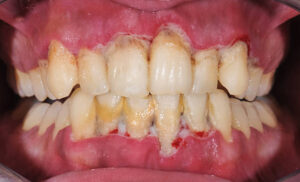 Did you know that at least 50% of adults have a form of gum disease? Although it is almost 100% preventable, it is a leading cause of tooth loss, but that’s not the only concern. Researchers have found several connections between gum disease and an increased risk of various health issues, including heart attacks, diabetes, and preterm delivery. However, new research suggests a connection between the infection and Alzheimer’s. Here’s what you need to know to keep your gums healthy to support your brain health.
Did you know that at least 50% of adults have a form of gum disease? Although it is almost 100% preventable, it is a leading cause of tooth loss, but that’s not the only concern. Researchers have found several connections between gum disease and an increased risk of various health issues, including heart attacks, diabetes, and preterm delivery. However, new research suggests a connection between the infection and Alzheimer’s. Here’s what you need to know to keep your gums healthy to support your brain health.
What is Gum Disease?
Bacteria in plaque and tartar buildup inflames and irritates the gums, which is most often caused by poor oral hygiene. Gingivitis is the first stage of the infection, which causes red, swollen, and bleeding gums. With no treatment, the infection can progress to advanced periodontitis. At this point, it can destroy the supporting structures of your teeth and underlying bone. Bacteria from the infection may enter your bloodstream through the pressure of regular chewing. As it circulates your body, it wreaks havoc on your general health.
Gum Disease and Brain Health
A study published in Science Advances found a link between the bacteria from gingivitis and Alzheimer’s. The bacteria may lead to the production of beta-amyloid proteins, which is a toxic protein that occurs in Alzheimer’s. They found bacteria from gum disease in the brains of deceased Alzheimer’s patients.
A study conducted by Cortexyme, a U.S. pharmaceutical company, tested mice to monitor how the bacteria spread to the brain. They found it destroyed neurons and produced characteristics of Alzheimer’s.
How to Keep Your Gums Healthy
Although gum disease is common, it’s easy to keep the infection at bay by following a few tips:
- Brush Your Teeth: Brush your teeth at least twice a day for 2 minutes using a soft-bristled toothbrush and non-abrasive toothpaste.
- Floss Every Day: Daily flossing removes food residue and plaque your toothbrush cannot reach to support your gum health.
- Don’t Smoke: Smoking and tobacco are known to increase your risk of dental problems, including cavities and gum disease.
- Moderate Alcohol: Alcohol can affect your body’s immune system, making it more difficult to fight infections.
Visit Your Dentist Regularly
In addition to caring for your dental health at home, schedule a cleaning and checkup with your dentist every 6 months. They’ll monitor your gums for any changes to provide the quick treatment you need to stop the infection in its tracks.
About Dr. Joe Ornelas
Dr. Ornelas earned his dental degree from the Indiana University School of Dentistry and has continued his education in many specialties, like the prevention, diagnosis, and treatment of gum disease. He is a proud member of several professional organizations, including the American Dental Association and the Indiana Dental Association. Request an appointment through his website or call his office at (219) 243-5485.
